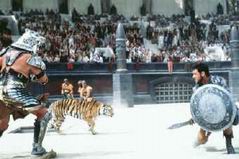Gladiator
Forget snowboarding and base jumping. Today’s thrill seeker’s think they invented extreme sports. Far from it. That honor would go to the gladiators of ancient Rome, who were trained with one goal in mind: kill or be killed. As if life in ancient Rome wasn’t harsh and decadent enough, imagine being enslaved and forced into brutal combat for the amusement of the masses.

Like Kubrick, Scott is noted for his attention to detail. The backdrop of ancient Rome is perfectly rendered by production designer Arthur Max and visual effects supervisor John Nelson. Combining physical sets with digital images allows Scott the scope needed to create images that are truly spectacular and believable.
Even though “Gladiator” is a little long in the tooth, it remains a visually exciting reminder of what good filmmaking is all about. With the help of writers David Franzoni, John Logan and William Nicholson, Scott is able to avoid the pitfalls of the modern epic. Most modern epics fail because they use spectacle to hide a weak script.
The script for “Gladiator” isn’t just dependable, but powerfully evoking. The dialogue is sparse but well chosen. Characters don’t make long winded speeches or declarations. Instead, their actions speaks louder than words, and to that effect, Scott has chosen a cast with tremendous presence.
Russell Crowe perfectly embodies the character Maximus, a General under Marcus Aurelius, whose loyalty to his leader dooms him and family. Crowe, rugged and buff after losing the extra weight he put on for “The Insider,” shows us a man who has seen his share of battle and just wants to go home. There’s an honest weariness in Crowe’s eyes and lifeless face.
When Maximus is betrayed by Commodus (Joaquin Phoenix), the cowardly son of Aurelius, and sentenced to death, that weariness turns to fierce determination. Even as he plots his revenge against Commodus, Maximus remains true and loyal to those around him. When he finds himself a slave, instead of revolting, he befriends the other slaves and his owner. As a former General, he knows that there is strength is numbers.
That proves true when Maximus and his fellow slaves are invited to the Colosseum to participate in a series of gladiator games hosted by Commodus to appease the citizens of Rome. Since he and his friends are considered nothing more than fresh meat, Maximus uses his military training to protect them. It pays off, making him a hero in the eyes of the people. When Commodus learns who the hero is, he vows to end his life once and for all.
The writers mix fact with fiction, and even though the film isn’t historically accurate, it does convey the spirit of the times. “Gladiator” is such a crowd pleaser on so many levels, historical accuracy isn’t even a concern. Instead, men will appreciate the film’s visceral pleasures, while women will enjoy the high drama and Crowe’s towering performance.
Crowe gets an admirable foe in Joaquin Phoenix as Commodus. Even though his emperor is still a spoiled brat, Phoenix avoids caricature by playing him as a man instead of a monster. He’s extremely cool and calculated, all traits that Phoenix brings to the character. You honestly fear and despise this man, especially when he puts the moves on his sister Lucilla (Connie Nielsen).
Nielsen, whose career seemed lost in space after “Soldier” and “Mission to Mars,” grounds Lucilla with an earnestness that is uncommon in testosterone theater. Once the object of Maximus’ affections, you sense that Lucilla doesn’t aid him out of love but because he’s noble. Nielsen helps us understand the difference between love and lust.
The film’s spectacle is also grounded by excellent supporting performances, most notably Oliver Reed as a former gladiator turned trainer and slave owner. In his last performance before his death, Reed excels at playing a man who deals in human misery but is able to know greatness when he sees it. His scenes are some of the film’s most engaging moments, laced with wisdom and honesty.
Richard Harris is also commanding as Emperor Marcus Aurelius, a man who understands that Rome would be better served by a noble General than his conniving son.
Filled with all of the elements of classic Greek tragedy, “Gladiator” proves that with the proper respect, Roman epics can be vital and interesting. They may have wore out their welcome in the middle sixties, but the genre is alive and well thanks to Scott and his talented group of filmmakers.
Cinematographer John Mathieson bathes every scene in muted tones to create the illusion of a dark and decadent time. He places his camera right in the middle of the action, forcing us to become participants. Pietro Scalia’s precision editing pulls it all together. The ethereal music of Hans Zimmer and Lisa Gerrard fuels the action and underscores the drama.
Scott has always been a master of creating alternate universes, and his depiction of ancient Rome is inviting. He takes us places and shows us things that would have been impossible ten years ago. Scott never allows the films action to extinguish the dramatic fire. Instead, he allows both to burn brightly.
“Gladiator” has been rated R for violence, which is essential to the story. The violence, both in the Colosseum and on the battlefield, is realistic and brutal. It needs to be. The filmmakers don’t revel in the violence but use it to show us how ugly and harsh death can be. It’s a lesson well learned.
GLADIATOR
Russell Crowe, Joaquin Phoenix, Connie Nielsen, Oliver Reed, Richard Harris, Derek Jacobi, Djimon Hounsou in a film directed by Ridley Scott. Rated R. 150 Minutes.
LARSEN RATING: $6
